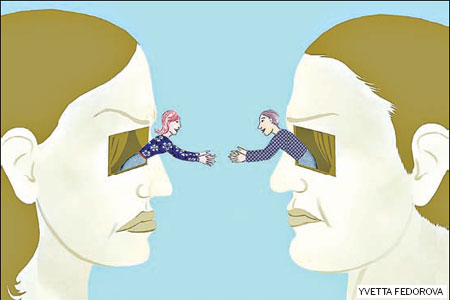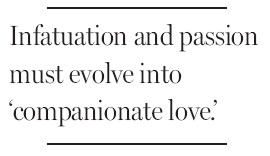A lack of effort to keep the love alive can doom a marriage
Updated: 2013-02-03 09:55
By Jane E. Brody(The New York Times)
|
|||||||


When people fall in love and decide to marry, the expectation is nearly always that love and marriage and the happiness they bring will last; as the vows say, till death do us part. Only the most cynical among us would think, walking down the aisle, that if things don't work out, "We can always split."
While some divorces are clearly justified by physical or emotional abuse, intolerable infidelity, addictive behavior or incompatibility, experts say many marriages seem to have just withered and died from a lack of effort to keep the embers of love alive.
I say "embers" because the flame of love - the feelings that prompt people to forget all their troubles and fly down the street with wings on their feet does not last very long, and cannot if lovers are ever to get anything done. The passion ignited by a new love inevitably cools and must mature into longer-lasting caring, compassion and companionship.
Studies by Richard E. Lucas and colleagues at Michigan State University have shown that the happiness boost that occurs with marriage lasts only about two years, after which people revert to their former levels of happiness.
Infatuation and passion have even shorter life spans, and must evolve into "companionate love, composed more of deep affection, connection and liking," according to Sonja Lyubomirsky, a professor of psychology at the University of California, Riverside.
In her new book, "The Myths of Happiness," Dr. Lyubomirsky describes research-tested actions that can do wonders to keep love alive.
She points out that the natural human tendency to become "habituated" to positive circumstances - to get so used to things that make us feel good that they no longer do - can be the death knell of marital happiness. Psychologists call it "hedonic adaptation": things that thrill us tend to be short-lived.
Dr. Lyubomirsky suggests adopting measures to avert, or at least slow down, the habituation that can lead to marital dissatisfaction.
Steps to slow, prevent or counteract hedonic adaptation should be taken long before the union is in trouble. Dr. Lyubomirsky recommended making time to be together and talk, truly listening to each other, and expressing admiration and affection.
Also important is variety, which is innately stimulating and rewarding and "critical if we want to stave off adaptation," the psychologist writes. Be spontaneous, change how you do things with your partner to keep your relationship "fresh, meaningful and positive."
Variety goes hand in hand with another tip: surprise. With time, partners tend to fall into routines that become stultifying. Try new activities, new places, new friends. Learn new skills together.
"A pat on the back, a squeeze of the hand, a hug, an arm around the shoulder - the science of touch suggests that it can save a so-so marriage," Dr. Lyubomirsky writes.
Even a marriage that has been marred by hurtful remarks can often be rescued by filling the home with words that elicit positive emotions, psychology research has shown.
According to studies by Barbara L. Fredrickson, a social psychologist and professor at the University of North Carolina at Chapel Hill, a flourishing relationship needs three times as many positive emotions as negative ones. Dr. Fredrickson says cultivating positive energy every day "motivates us to reach out for a hug more often."
Dr. Lyubomirsky reports that happily married couples average five positive verbal and emotional expressions toward one another for every negative expression, but "very unhappy couples display ratios of less than one to one."
She suggests asking yourself each morning, "What can I do for five minutes today to make my partner's life better?"
The New York Times
(China Daily 02/03/2013 page11)